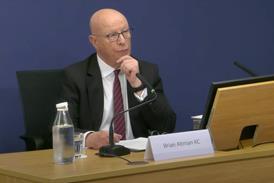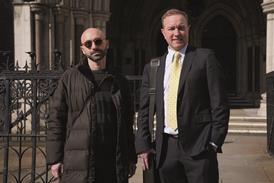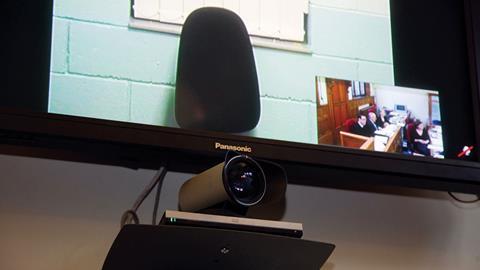It is foolish to try to predict the long-term consequences for legal services of the coronavirus disaster. Not even the super-forecasters that the prime minister’s office was so keen to recruit earlier in the year have been able to predict what is unfolding just a few weeks later.

The Black Death in England, a much more devastating illness which the existing community had practically no tools to manage, arrived in 1348. It is usually seen as leading to the Peasants’ Revolt of 1381, nearly 40 years later, and the eventual disappearance of serfdom around 1400. None of that was foreseeable in its early days.
But I shall nevertheless attempt the foolish thing, and try to picture the consequences for our profession of the current draconian quarantine measures, which are likely to last for some weeks or months, and of the economic fall-out. We should all be doing the same.
The obvious result is that we shall be moving our professional lives even more online. I do not believe that the advantages of video-conferencing will be ditched as soon as the crisis is over, because we can see that in-person meetings, fruitful as they are in terms of networking and informal exchanges, can be almost wholly and successfully replaced by careful chairing of remote meetings. And remote meetings come without the expense of travel and maybe accommodation, and of the time taken in getting there and back. The demands of climate change alone should see us moving in that direction.
But there are clearly grave problems with certain aspects of legal life moving online. The criminal courts provide a good example. Who is out of shot when a defendant appears on video from a prison, and is there off-screen intimidation? Can a judge really assess responses from a witness or defendant when given remotely via a screen? Does the remote defendant have access to a lawyer in the room? What if the witness or defendant needs to study documents remotely? How do we ensure that they are the right documents? Is the video connection safe from surveillance or interference? Some of these problems translate to the civil courts as well.
There are clearly grave problems with certain aspects of legal life moving online. Who is out of shot when a defendant appears on video from a prison, and is there off-screen intimidation?
Overall, lawyers will find themselves in the middle of the conflict between the ease, speed and health advantages of technology, and its human rights intrusions, as in the fair trial example above.
There are other and completely different examples of such a conflict. There is talk now about mobile phone location and usage data being given to the government by phone companies, to monitor whether coronavirus limitation measures, such as asking the public to stay at home, are working. South Korea has been very successful in controlling the virus by using this data to warn people to stay away from areas where there is an infected person.
It is obvious how the traditional human liberty to go about our lives without the government interfering is infringed when we are tracked in this way, even for an accepted public good. It is lawyers who will be at the forefront of the frontier being drawn between what is acceptable and what not.
The other obvious consequence for our professional lives is more immediate. There are certain areas of law which are doubtless seeing a regrettable spike in demand – wills and estate planning, and employment law, for instance.
Regarding employment law, and to return to my earlier citation about the disappearance of serfdom, I imagine that our own current version of serfs – the gig workers for large electronic platforms, and those on zero-hours contracts – will see their own status transformed for the better after the current crisis is over. That is because the world will have seen how unfair it is that employers should deprive their workers of basic rights at a time when such rights can save lives.
Healthcare lawyers must be working overtime advising their clients, as must government and local authority lawyers, in view of the unprecedented laws being introduced.
Unfortunately, there is doubtless a serious economic downturn on the way. Lawyers will be dealing with the consequences of supply chain disruptions, debt restructuring, the cancellation or postponement of major conferences and other large events, and whether a pandemic allows for contractual obligations to be voided. Among the business collapses will doubtless be law firms.
These are the immediate consequences. I wish I had the skill to foresee what the longer-term trends will be.
Some speak of the retreat of globalisation, which would have an obvious impact on City law firms, but I don’t see that happening – and in any case overseas branches of City firms are likely to be chiefly staffed by local lawyers, who often undertake domestic work. We should all now think about the future fallout, so we can harness the inevitable changes to improve the administration of justice.
Jonathan Goldsmith is Law Society Council member for EU matters and a former secretary general of the Council of Bars and Law Societies of Europe. All views expressed are personal and do not necessarily reflect the views of the Law Society Council





























No comments yet